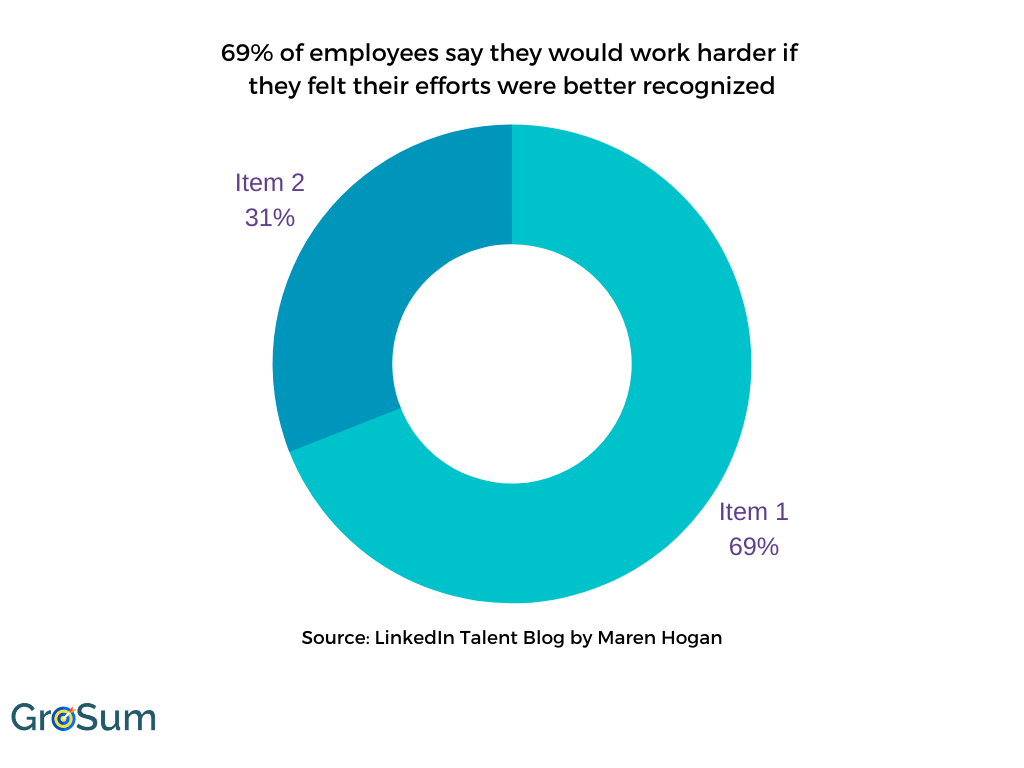
If you want your employees to more actively participate in career planning and performance evaluation, you might benefit from employee self-evaluation. This method allows organizations to increase employee engagement significantly, helping employees focus on their performance. In addition, this approach makes it easier for employees to set career goals.
Employee self-evaluation helps employees prepare for their appraisal meetings with managers or performance development planning in a more meaningful way. They can analyze their performance and evaluate their contribution. If you want your employees to set stretch goals, this approach is especially effective. Thanks to self-reflection, employees can set long-term goals, aiming for better results. Self-evaluation can help employees develop intrinsic motivation in order to satisfy not the managers but themselves.
What Is Self-Evaluation
A self-evaluation is usually based on a set of questions. These questions help employees evaluate their performance during a certain period of time. This is a complex yet rewarding process that enables employees to focus on different aspects of their performance and to understand what areas need improvement. Employees are asked to think about various components of their performance, from their basic responsibilities to long-term career goals and professional development. This process offers a structural approach to planning and performance management, helping employees analyze their level of contribution.
The employee self-evaluation also helps establish effective communication between employees and managers during meetings. Performance feedback is extremely important, as 24% of employees consider changing their job because of inadequate performance feedback from managers. Self-evaluation enables employees to adopt an introspective approach when thinking about their job and their career goals. Obviously, such an approach is very effective because employees can better understand themselves. Not only can they determine their strengths and weaknesses, but they can also understand what direction of professional development is likely to benefit the most and where they can apply their skills with the best outcome.
Employee Self-Evaluation and Career Promotion
As we’ve already said above, the self-evaluation process helps employees plan their future in the organization. Self-evaluation can help employees target their possible promotions and next opportunities. For example, they can decide what kind of cross-training might be useful, or what other jobs they can try. It’s important to understand that career planning won’t make your employees think about leaving your company and searching for another employer unless the work environment in your company is really bad. In contrast, proper career development will help you retain your best employees. They should understand that they have a future in your company and their efforts will be appreciated. According to statistics, 69% of employees demonstrate higher productivity when they see that their company recognizes their efforts.

Companies may use traditional performance appraisal methods or newer performance management systems. No matter what method you choose to encourage your employees’ performance development, it makes sense to use the employee self-evaluation as an integral element of this process. First of all, the employees will certainly appreciate the opportunity for input. Secondly, your managers will get more information, obtaining insights into your employees’ motivation and understanding what makes them love their job.
Why Employees Are Afraid to Do Self-Evaluation
The main challenge associated with self-evaluation is that many employees are afraid to evaluate their performance. If you want to encourage your employees to do it, you should understand why your workers might feel discouraged to do it or what they are afraid of. There are many reasons why your employees might avoid self-evaluation, and here are a few of them.
-
They don’t have enough time:
This factor can be especially important if you ask your employees to evaluate their performance at the end of the year. The reason is that, in this case, most employees don’t have enough time for any additional tasks that go beyond their regular responsibilities. Therefore, we recommend that you choose the right time for an employee self-evaluation because you don’t want it to be an overwhelming task that puts your employees under stress.
-
They are just lazy:
Unfortunately, not all employees are engaged. Many employees are simply lazy and they would prefer to spend their spare time doing anything else. The self-evaluation process feels like another task associated with their job and they might want to avoid it. In this case, you should be able to deliver the right message, explaining why self-evaluation is important to them. They should understand that this process is beneficial not for the company or managers but for themselves, helping them properly plan their future.
-
They don’t understand the purpose of self-evaluation:
If you simply ask your employees to evaluate their own performance without explaining the purpose of this process, they won’t feel motivated to do it. Explaining the purpose of self-evaluation is your responsibility as an employer so we recommend that you answer any questions and provide examples of how self-evaluation can help employees set clear career goals and grow professionally.
-
They don’t understand the importance of performance evaluation:
This is another reason why your employees might feel discouraged to perform self-evaluation. They might think that this process is unnecessary or they may not understand how it can actually benefit them. In this case, it’s important to establish trustful relationships with your employees so that they will know that their opinion is valuable and their self-evaluation won’t be ignored by the managers.
-
Inadequate information, equipment, or memory to self-evaluate the performance:
Obviously, effective self-evaluation is impossible if an employee doesn’t have the necessary information to analyze it objectively. Quite often, employees have a hard time trying to remember all the projects they’ve been working on. Some employees might also not be able to evaluate their productivity because they’ve worked for your company for a short period of time so they don’t understand what projects and tasks are actually worth considering them. It’s important to explain that all the tasks are important. Employees should analyze their performance, even if they cannot find anything that seems important enough to share it with others.
How to Encourage Employees to Perform Self-Evaluation
#1 Talk about their careers
As we’ve already mentioned above, employee self-evaluation is not only about their current job but also about their long-term career plans and perspectives. Unfortunately, some employers forget about the importance of career planning for their employees. Therefore, we recommend that you start the dialogue and encourage your employees to talk about their careers.
If you don’t know where to start, a good solution might be to organize meetings with managers so that all the employees can express their thoughts and explain what they consider important in their careers, what they would like to learn, and what skills they would like to develop.
#2 Explain how self-evaluations are used
It will be easier for your employees to understand the importance of self-evaluation if you explain how it will be used to benefit them. Be clear about who will read their self-evaluations and how they will impact their career growth. Your employees should know whether or not their self-evaluation can lead to promotion, rewards, or bonuses. You can also send your employees emails with the necessary materials so that they can read them and better understand the process. If you have remote employees who work from another country and speak a different language, you can use a translation service like The Word Point.
#3 Be positive
One of the most important things about the employee self-evaluation process is to explain that it won’t be used against them. An effective self-evaluation means that employees should address their weaknesses, and they won’t be able to do this if they feel that managers will use this information in a negative context.
Therefore, you should show your employees that you’re ready to provide them with training and the necessary tools to help them improve their skills. This way, they won’t be afraid to talk about their weaknesses because they will know that you will use this information to help them become better professionals.
#4 Recognize achievements
Encourage your employees to be specific about their achievements and make sure to recognize each employee’s contribution. You may want to offer some bonuses or simply mention your employees’ achievements during meetings or incorporate chats. Let them know that their boss wants to know what problems they’ve solved, what tasks they’ve accomplished, and how they did it. Explaining how exactly they’ve achieved something is especially important. If your employees focus on the details, they’ll be able to better analyze their performance, getting more useful insights.
#5 Offer guidance and mentoring
Employees should receive feedback from managers. However, the feedback shouldn’t be critical. The whole point of feedback is not to criticize employees but to offer them advice and to show them the right direction for development. It’s important to train managers so that they can provide your employees with the necessary guidance.
Final Thoughts
Employee self-evaluation is a great method that enables organizations to better understand their employees. It is beneficial for both employees and employers, as managers can get insights into their employees’ motivations, while employees can set clear career goals. Although employees might be afraid to perform self-evaluation at first, you can encourage them to do it if you build trustful relationships and stay positive. Your employees should see self-evaluation as an opportunity to become better professionals.